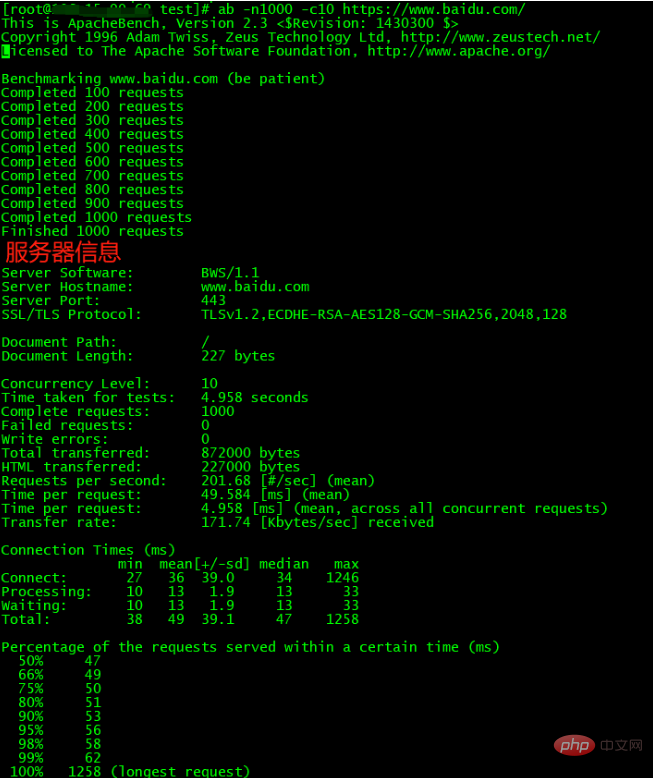How to use apache ab

How to use apache ab
Basic use of Apache ab
ab introduction
ab is the abbreviation of Apache HTTP server benchmarking tool, which can be used to test the server performance of HTTP requests. It provides simple and easy-to-use performance testing tool command combinations through different parameters on the command line.
ab command principle
Apache's ab command simulates multi-threaded concurrent requests, tests server load pressure, and can also test the pressure of other web servers such as nginx, lighthttp, IIS, etc. .
The ab command has very low requirements on the computer that issues the load. It will not occupy a lot of CPU or memory, but it will cause a huge load to the target server, so it is a certain DDOS attack. A must-have medicine suitable for all ages. You must also be careful when using it yourself. Otherwise, too much load is applied at once, causing the target server to crash due to running out of memory and having to hard restart, which is not worth the loss.
In the case of insufficient bandwidth, it is best to test on the local machine. It is recommended to use another or multiple servers on the intranet to test through the intranet. The data obtained in this way will be much more accurate. . Remote stress testing of web servers often yields unsatisfactory results (due to excessive network latency or insufficient bandwidth)
I won’t go into details about the installation, as long as Apache is installed. You can refer to the previous article
Basic parameter usage method 1
Parameter description: -n number of requests, -c number of concurrency
ab -n1000 -c10 https://www.baidu.com/ 代表对百度首页请求1000次,并发10.
Result description

Version information description
This is ApacheBench, Version 2.3 <$Revision: 1430300 $> Copyright 1996 Adam Twiss, Zeus Technology Ltd, http://www.zeustech.net/ Licensed to The Apache Software Foundation, http://www.apache.org/
Progress description
Benchmarking www.baidu.com (be patient) Completed 100 requests Completed 200 requests Completed 300 requests Completed 400 requests Completed 500 requests Completed 600 requests Completed 700 requests Completed 800 requests Completed 900 requests Completed 1000 requests Finished 1000 requests
Server information
Server Software: BWS/1.1 Server Hostname: www.baidu.com Server Port: 443 SSL/TLS Protocol: TLSv1.2,ECDHE-RSA-AES128-GCM-SHA256,2048,128 Document Path: / Document Length: 227 bytes Concurrency Level: 10 Time taken for tests: 4.958 seconds Complete requests: 1000 Failed requests: 0 Write errors: 0 Total transferred: 872000 bytes HTML transferred: 227000 bytes
Server's Throughput, request processing per second
Requests per second: 201.68 [#/sec] (mean)
Average user waiting time
Time per request: 49.584 [ms] (mean)
Processing time of a single request on the server side
Time per request: 4.958 [ms] (mean, across all concurrent requests)
received The average traffic on the network per second, can Helps troubleshoot whether there is a problem of prolonged response time caused by excessive network traffic
Transfer rate: 171.74 [Kbytes/sec] received Connection Times (ms) min mean[+/-sd] median max Connect: 27 36 39.0 34 1246 Processing: 10 13 1.9 13 33 Waiting: 10 13 1.9 13 33 Total: 38 49 39.1 47 1258
Response status of all requests in the entire scenario.
Percentage of the requests served within a certain time (ms) 50% 47 66% 49 75% 50 80% 51 90% 53 95% 56 98% 58 99% 62 100% 1258 (longest request)
Usage summary
a.ab Judging success or failure only determines the response result of 2xx
b.Only suitable For a simple stress test of an interface or page
c.ab, you can also fill in the parameters for stress testing.
For more Apache related knowledge, please visit the Apache usage tutorial column!
The above is the detailed content of How to use apache ab. For more information, please follow other related articles on the PHP Chinese website!

Hot AI Tools

Undresser.AI Undress
AI-powered app for creating realistic nude photos

AI Clothes Remover
Online AI tool for removing clothes from photos.

Undress AI Tool
Undress images for free

Clothoff.io
AI clothes remover

AI Hentai Generator
Generate AI Hentai for free.

Hot Article

Hot Tools

Notepad++7.3.1
Easy-to-use and free code editor

SublimeText3 Chinese version
Chinese version, very easy to use

Zend Studio 13.0.1
Powerful PHP integrated development environment

Dreamweaver CS6
Visual web development tools

SublimeText3 Mac version
God-level code editing software (SublimeText3)

Hot Topics
 PHP Framework Performance Comparison: The Ultimate Showdown of Speed vs. Efficiency
Apr 30, 2024 pm 12:27 PM
PHP Framework Performance Comparison: The Ultimate Showdown of Speed vs. Efficiency
Apr 30, 2024 pm 12:27 PM
According to benchmarks, Laravel excels in page loading speed and database queries, while CodeIgniter excels in data processing. When choosing a PHP framework, you should consider application size, traffic patterns, and development team skills.
 How to add a server in eclipse
May 05, 2024 pm 07:27 PM
How to add a server in eclipse
May 05, 2024 pm 07:27 PM
To add a server to Eclipse, follow these steps: Create a server runtime environment Configure the server Create a server instance Select the server runtime environment Configure the server instance Start the server deployment project
 How to conduct concurrency testing and debugging in Java concurrent programming?
May 09, 2024 am 09:33 AM
How to conduct concurrency testing and debugging in Java concurrent programming?
May 09, 2024 am 09:33 AM
Concurrency testing and debugging Concurrency testing and debugging in Java concurrent programming are crucial and the following techniques are available: Concurrency testing: Unit testing: Isolate and test a single concurrent task. Integration testing: testing the interaction between multiple concurrent tasks. Load testing: Evaluate an application's performance and scalability under heavy load. Concurrency Debugging: Breakpoints: Pause thread execution and inspect variables or execute code. Logging: Record thread events and status. Stack trace: Identify the source of the exception. Visualization tools: Monitor thread activity and resource usage.
 Application of algorithms in the construction of 58 portrait platform
May 09, 2024 am 09:01 AM
Application of algorithms in the construction of 58 portrait platform
May 09, 2024 am 09:01 AM
1. Background of the Construction of 58 Portraits Platform First of all, I would like to share with you the background of the construction of the 58 Portrait Platform. 1. The traditional thinking of the traditional profiling platform is no longer enough. Building a user profiling platform relies on data warehouse modeling capabilities to integrate data from multiple business lines to build accurate user portraits; it also requires data mining to understand user behavior, interests and needs, and provide algorithms. side capabilities; finally, it also needs to have data platform capabilities to efficiently store, query and share user profile data and provide profile services. The main difference between a self-built business profiling platform and a middle-office profiling platform is that the self-built profiling platform serves a single business line and can be customized on demand; the mid-office platform serves multiple business lines, has complex modeling, and provides more general capabilities. 2.58 User portraits of the background of Zhongtai portrait construction
 The evasive module protects your website from application layer DOS attacks
Apr 30, 2024 pm 05:34 PM
The evasive module protects your website from application layer DOS attacks
Apr 30, 2024 pm 05:34 PM
There are a variety of attack methods that can take a website offline, and the more complex methods involve technical knowledge of databases and programming. A simpler method is called a "DenialOfService" (DOS) attack. The name of this attack method comes from its intention: to cause normal service requests from ordinary customers or website visitors to be denied. Generally speaking, there are two forms of DOS attacks: the third and fourth layers of the OSI model, that is, the network layer attack. The seventh layer of the OSI model, that is, the application layer attack. The first type of DOS attack - the network layer, occurs when a large number of of junk traffic flows to the web server. When spam traffic exceeds the network's ability to handle it, the website goes down. The second type of DOS attack is at the application layer and uses combined
 How to deploy and maintain a website using PHP
May 03, 2024 am 08:54 AM
How to deploy and maintain a website using PHP
May 03, 2024 am 08:54 AM
To successfully deploy and maintain a PHP website, you need to perform the following steps: Select a web server (such as Apache or Nginx) Install PHP Create a database and connect PHP Upload code to the server Set up domain name and DNS Monitoring website maintenance steps include updating PHP and web servers, and backing up the website , monitor error logs and update content.
 How to leverage Kubernetes Operator simplifiy PHP cloud deployment?
May 06, 2024 pm 04:51 PM
How to leverage Kubernetes Operator simplifiy PHP cloud deployment?
May 06, 2024 pm 04:51 PM
KubernetesOperator simplifies PHP cloud deployment by following these steps: Install PHPOperator to interact with the Kubernetes cluster. Deploy the PHP application, declare the image and port. Manage the application using commands such as getting, describing, and viewing logs.
 How to implement PHP security best practices
May 05, 2024 am 10:51 AM
How to implement PHP security best practices
May 05, 2024 am 10:51 AM
How to Implement PHP Security Best Practices PHP is one of the most popular backend web programming languages used for creating dynamic and interactive websites. However, PHP code can be vulnerable to various security vulnerabilities. Implementing security best practices is critical to protecting your web applications from these threats. Input validation Input validation is a critical first step in validating user input and preventing malicious input such as SQL injection. PHP provides a variety of input validation functions, such as filter_var() and preg_match(). Example: $username=filter_var($_POST['username'],FILTER_SANIT






